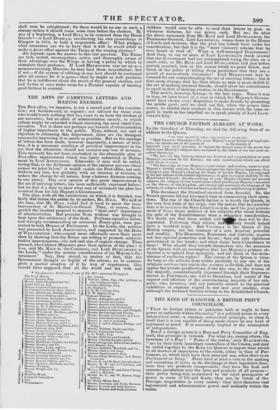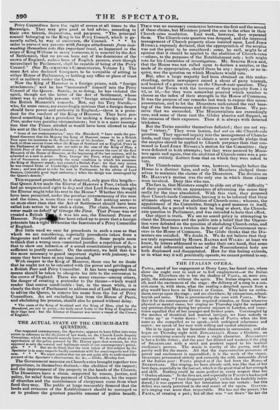THE KING OF HANOVER A BRITISH PRIVY COUNCILLOR.
" THAT no foreign prince or potentate bath or ought to have power or authority within this real in," is a political axiom in every independent state—a common self-evident principle, so clear in itself' that it is not capable of being made clearer by any kind of argument or proof. It is necessarily implied in the assumption of independence. But if a foreign prince is a Peer and Privy Councillor of Eng- land, this principle is violated. For what are, among others, the functions of a Peer ? " Peers of the realm," says BLacesrosue, " are by their birth hereditary councillors of the Crown, and may be called together by the King (or Queen) to impart their advice in all matters of importance to the realm, either in time of Par- liament, or, which hath been their principal use, when there is no Parliament in being." Peers have at least a veto in the making and unmaking of laws; in the discharge of their legislative func- tions they are perfectly irresponsible; they have the final and supreme jurisdiction over the lives and property of all persons— their power being only neutralized by the royal prerogative of mercy in cases of life and death ; they are, by virtue of the Peerage, magistrates in every county : they have therefore vast legislatorial and administrative power and authority within the realm. Privy Councillors have the right of access at all times to the Sovereign. They may give good or bad advice, according to their own talents, dispositions, and purposes. "The principal council belonging to the King is his Privy Council, which is ge- nerally called, by way of eminence, the Council. * * * In order to prevent any persons with foreign attachments from insi- nuating themselves into this important trust, as happened in the reign of King William in many instances, it is enacted by the Act of Settlement, that do person born out of the dominions of the crown of England, unless born of English parents, even though naturalized by Parliament, shall be capable of being of the Privy Council." (See BLAcasToNE's Commentaries, Volume I.) The same Act also declared foreigners to be incapable of sitting in either House of Parliament, or holding any office or place of trust civil or military under the Crown.
Now the King of Hanover is a foreign prince, with " foreign attachments;' and he has "insinuated" himself into the Privy Council of the Queen. Surely, in so doing, he has violated the spirit, though not the letter of the Act of Settlement, whose intent was to exclude persons with " foreign attachments" from the British Monarch's councils. But, say his Tory friends,— who, for some cause, are exceedingly anxious that a foreign despot
should have power and authority in England,—there is a prece-
dent for the conduct of the King of Hanover. They have pro- duced something like a precedent for making a foreign prince a
Peer, under very peculiar circumstances; but it is a mere assump- tion that the Prince alluded to would have been allowed to take his seat at the Council-beard.
" Some of our contemporaries," says the Standard, " have made the pro- found discovery that his Majesty the King of Hanover ceases to be a British Peer upon his accession to the Royal throne of his brother. We will not go back to those ancient times when the Kings of Scotland sat as English Peers in the Parliament of England, nor yet refer to the case of the King of Man, a British Peer of the seventeenth century ; but we presume the case of the first Monarch of the House of Hanover, at the beginning of the last century, will be admitted us a case in point. Now, George the First, when adopted by the Act of Succession into precisely the same condition in which his successor the King of Hanover stands, was created a British Peer : for that very reason he was created Duke of Cambridge, eight years before the death of Queen Anne ; and was about to take his seat in Parliament, by the advice of Lord Somers, (tolerably good legal authority,) when the design was interrupted by the Queen's demise."
This supposed precedent, be it observed, only goes this length— that Queen ANN made the Elector of Hanover a Peer, (which she had an unquestioned right to do,) and that Lord Somas thought the Elector might take his seat in the House.* Whether this would have been permitted, under the peculiar circumstances of the case and the times, is more than we can tell. But nothing seems to us more clear than that the Act of Settlement should have been called into action to bar such a claim. The claim, however, was never made on behalf of George the First. That Prince was not
created a British • it was his son, the Electoral Prince of Hanover. No pre has been raked up to prove that a foreign
potentate has a right xercise the functions of a Privy Councillor
of England.
But little need we care for precedents in such a case as that which we are considering, especially precedents taken from a dangerous and troubled rota of our history. Some people seem to think that a wrong once committed justifies a repetition of it,— that to show one infraction of a sound constitutional principle, is sufficient to justify another. On the contrary, we hold that it is the more necessary to guard important rights with jealousy, be- cause they have been at any time invaded.
With respect to the King of Hanover, there can be no doubt that he ought not to be intrusted with the power and privileges of a British Peer and Privy Councillor. It has been suggested that means should be taken to abrogate his title to the succession to the crown of England. There are many reasons—among others, the danger of creating a pretender to the throne—which would render that course unadvisable : but, in the mean while, it is clearly the duty of Parliament to address and of Lord MELBOURNE to advise the Queen, to remove his name from the list of Privy Councillors. An act excluding him from the House of Peers, and abolishing his pension, should also be passed without delay.
• The cases of the King of Scotland and the King of Man, cited by the Standard, are not in point,—for butts owed fealty to the King of England as their liege lord : but the Elector of Hanover was never a vassal of the Crown of England.



























 Previous page
Previous page